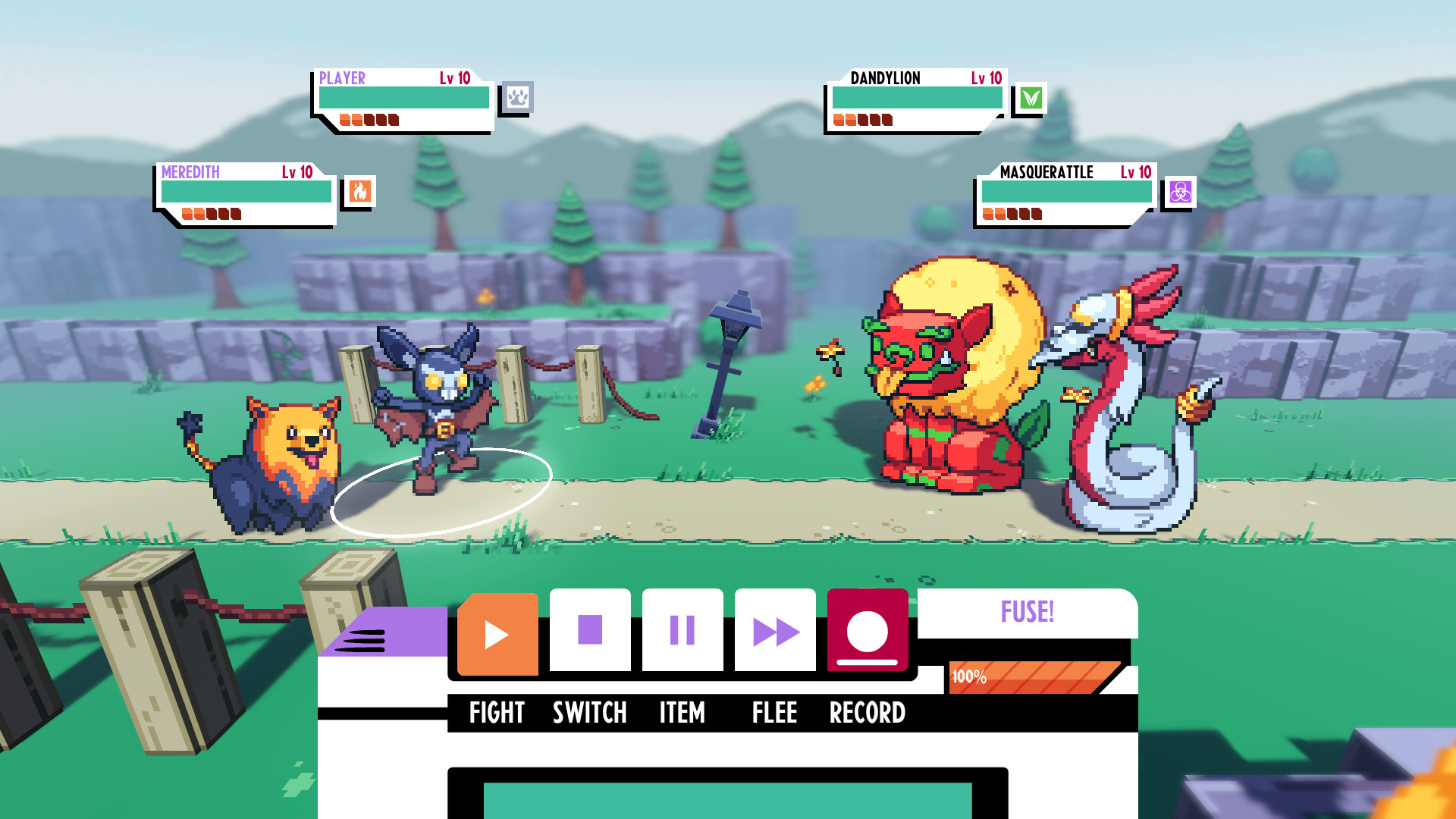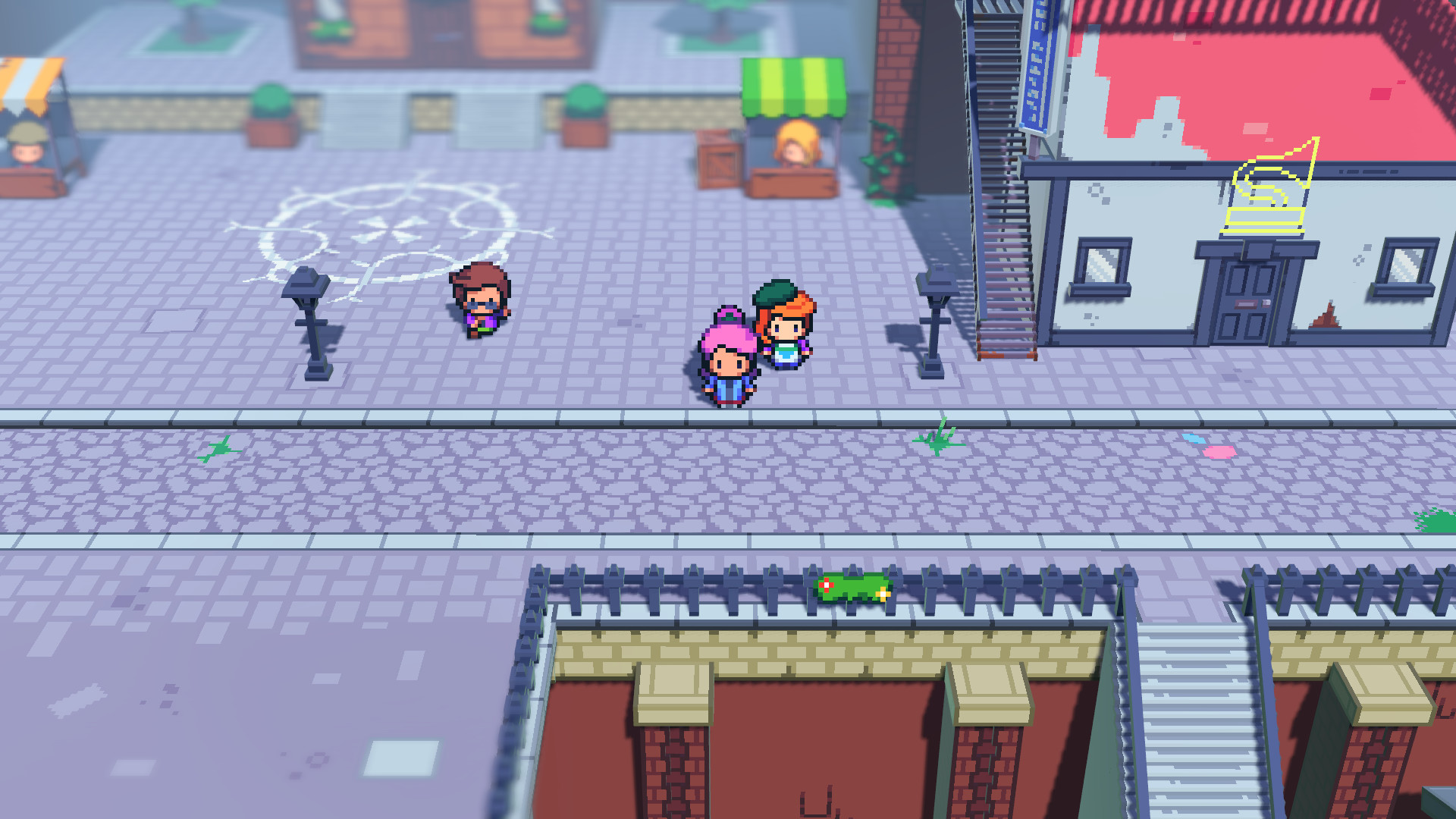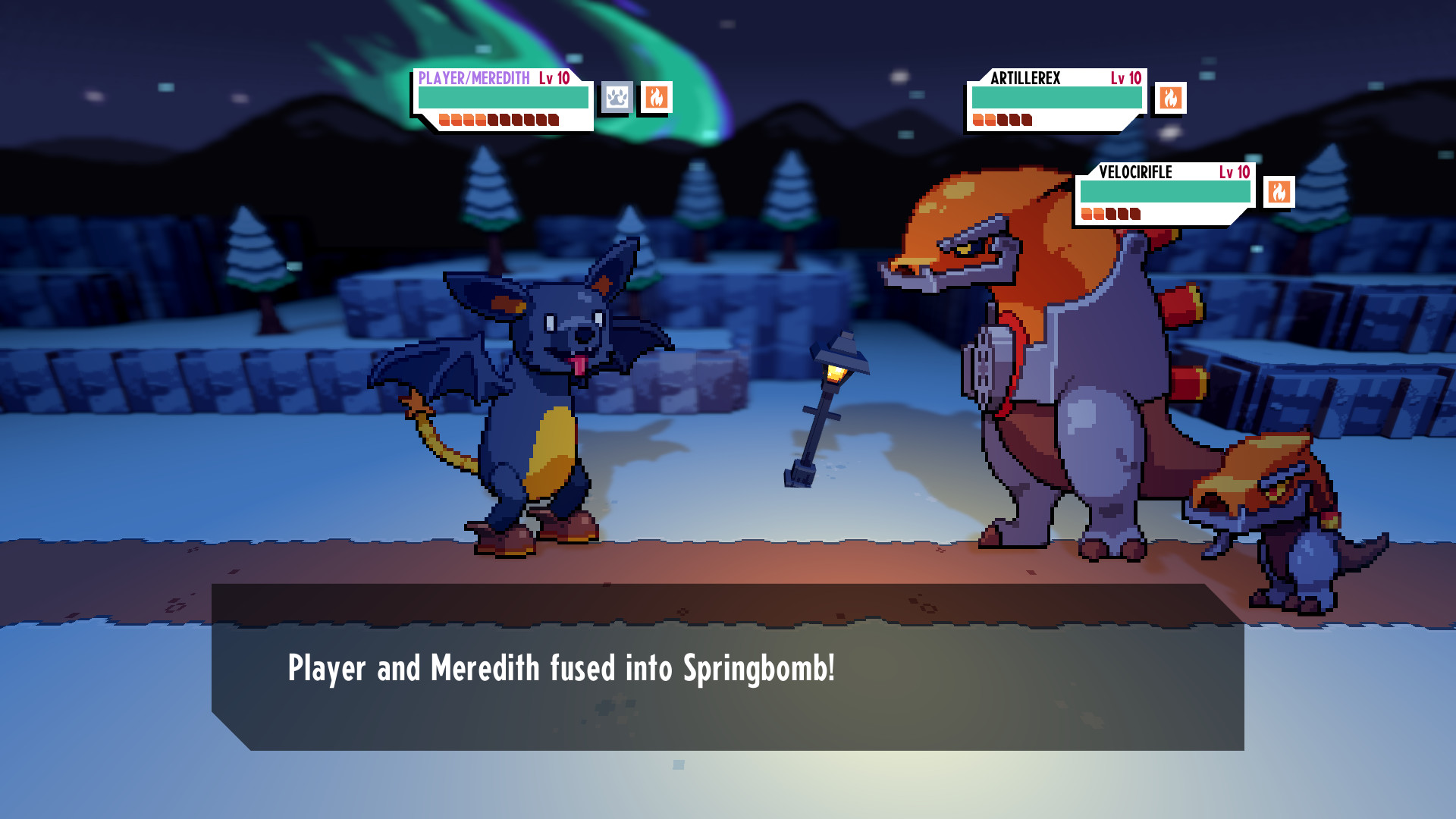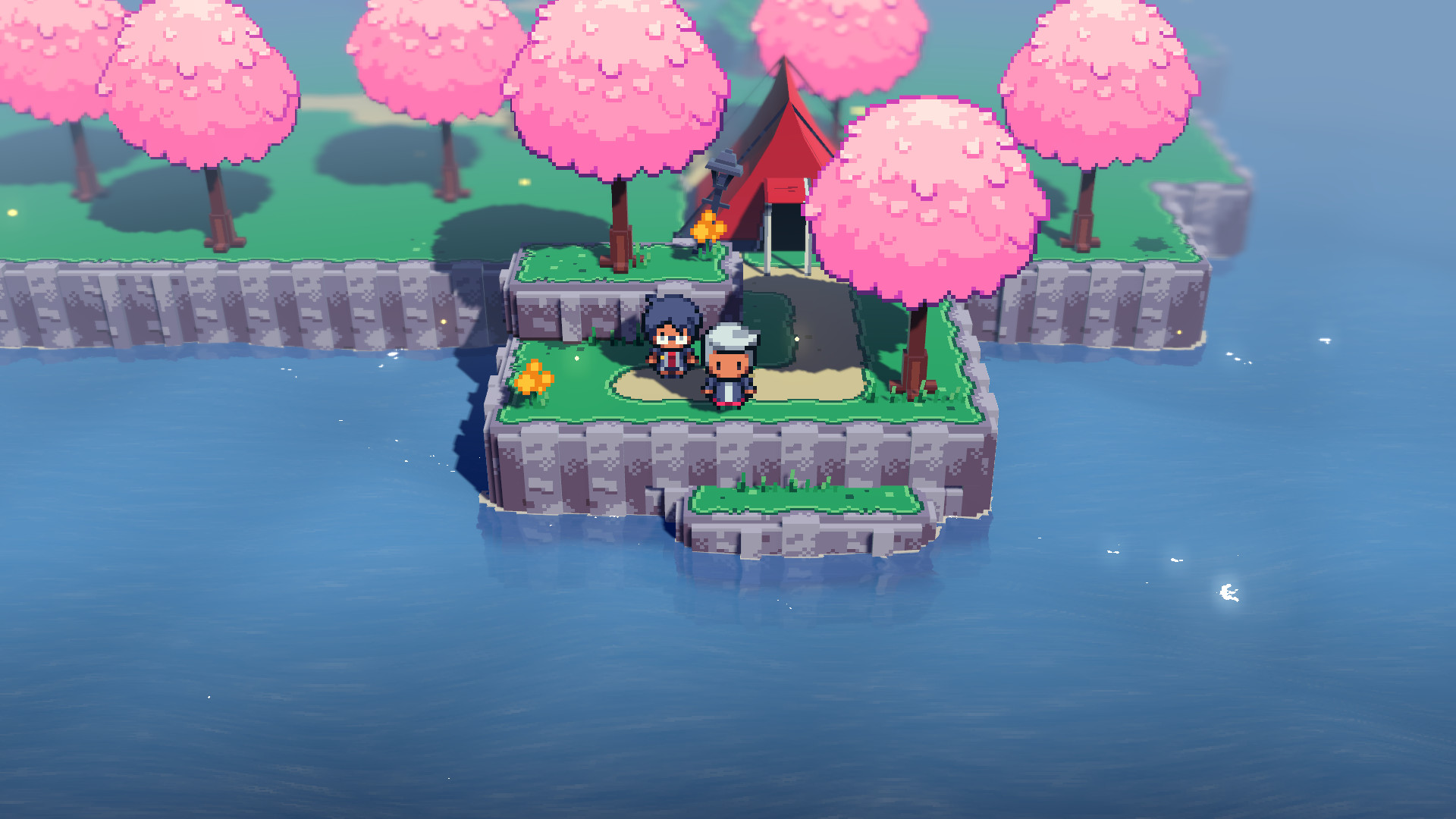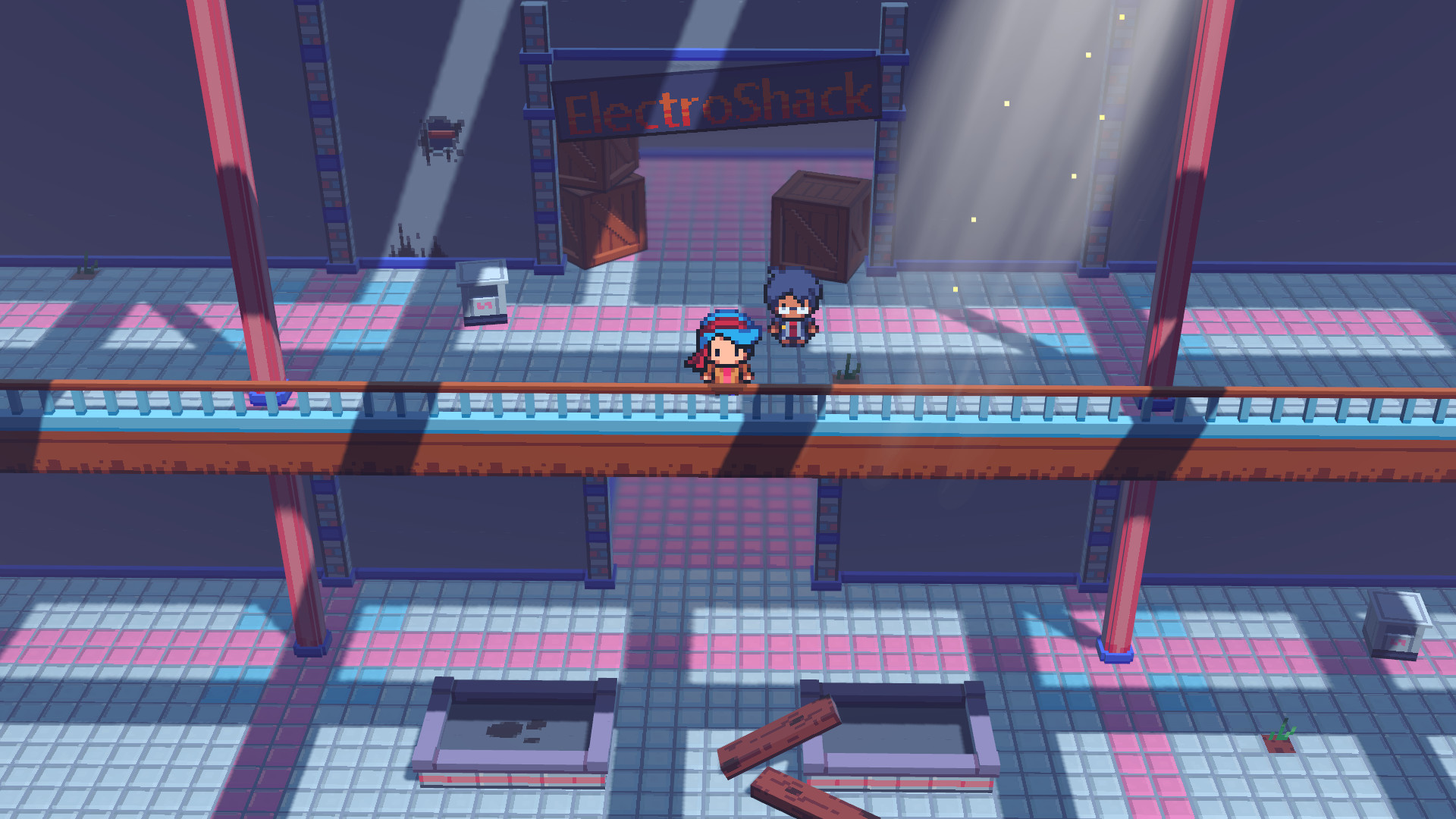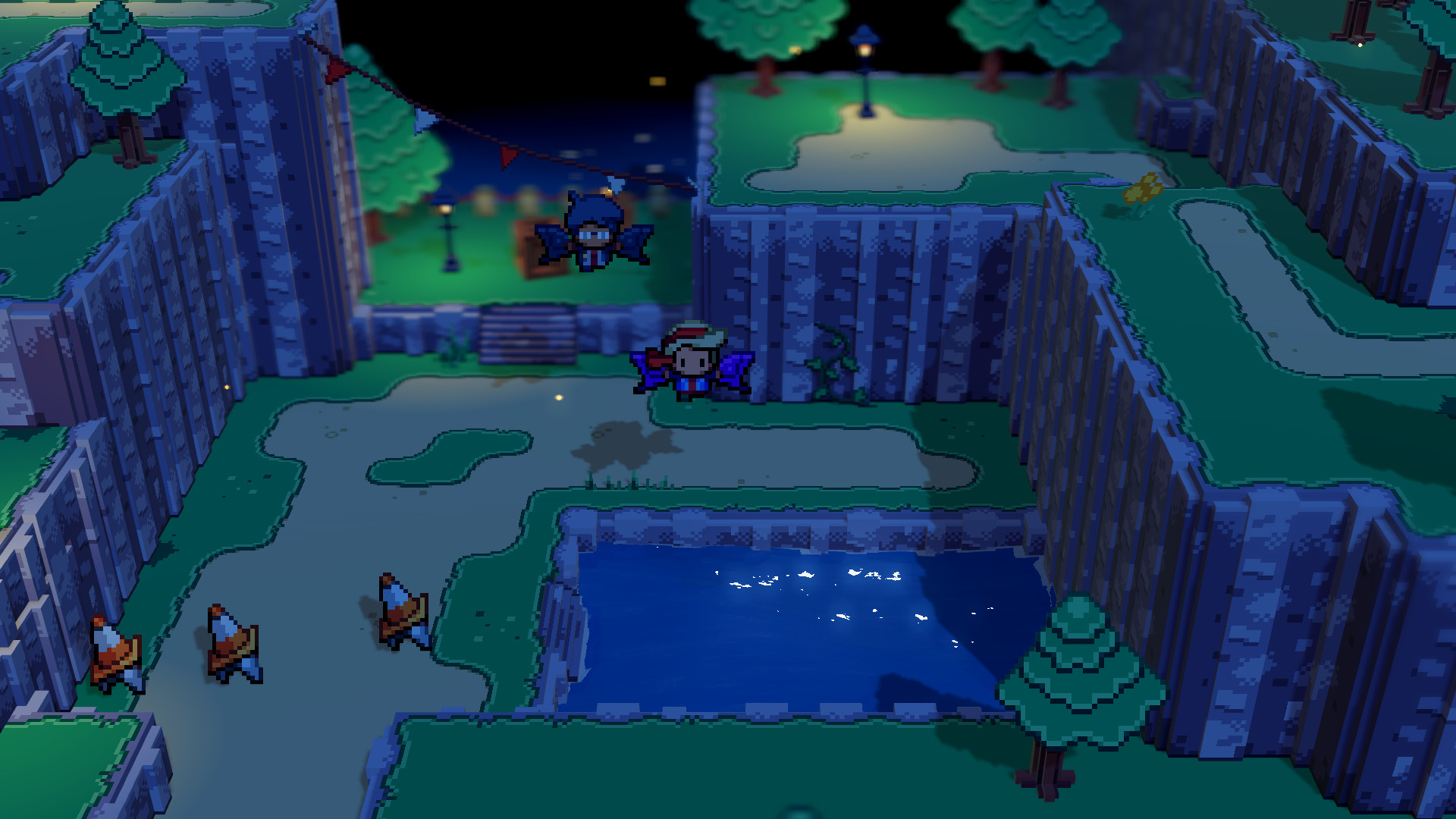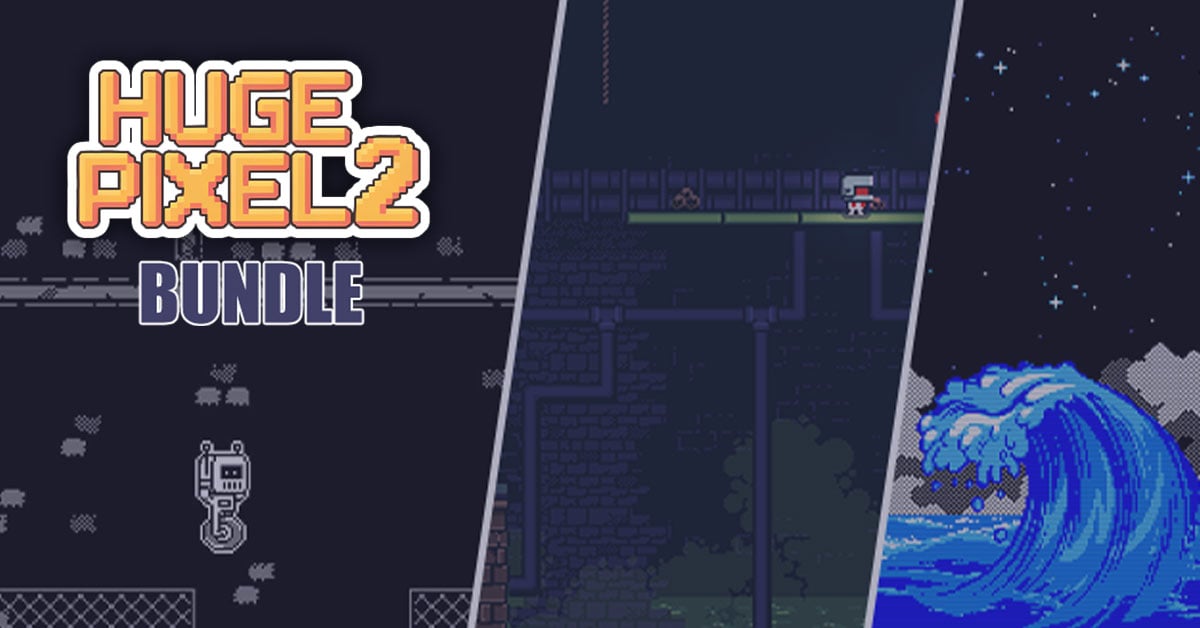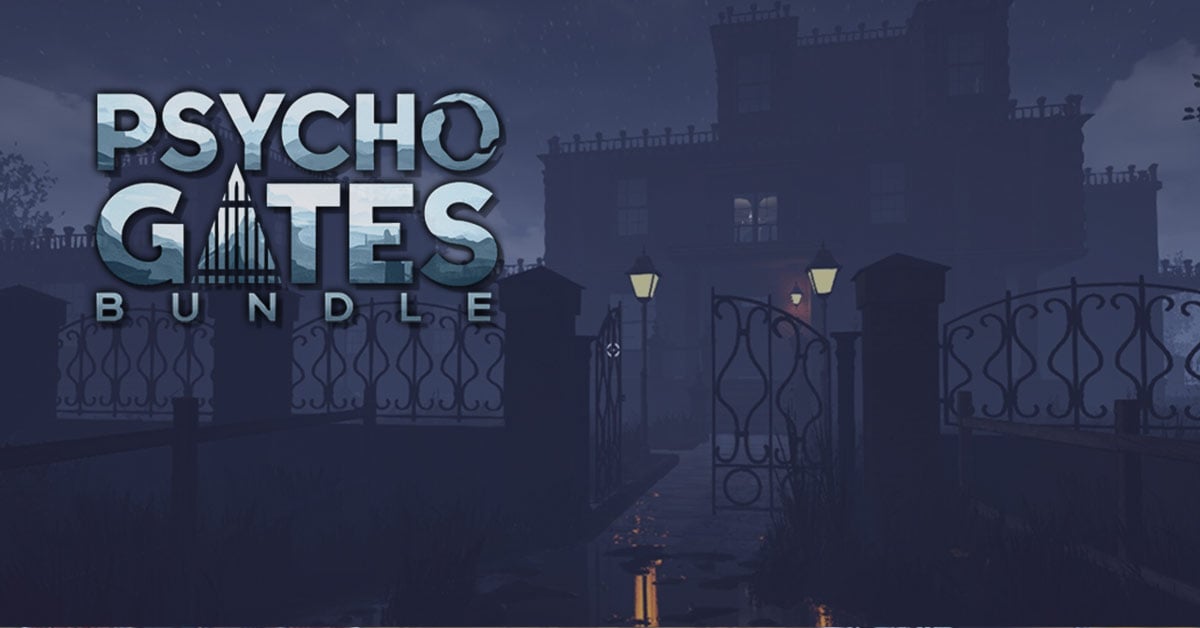Collect awesome monster forms to use during turn-based battles in this indie open-world RPG. Combine any two monster forms using Cassette Beasts’ Fusion System to create unique and powerful new ones!
Welcome to New Wirral, a remote island inhabited by creatures you’ve only dreamed of, nightmares you hopefully haven’t, and a cast of brave folks who use cassette tapes to transform for battle. To find a way home you’ll need to explore every inch of the island, and record monsters to tape to gain their abilities!

Features
- Transform into monsters using… retro cassette tapes?!
Faced with the constant threat of monster attacks, the residents of Harbourtown, New Wirral choose to fight fire with fire. Record a monster to tape, then play it back to take on its form for battle! - Fuse monster forms
Getting close to your companion has benefits–while transformed you can combine your strengths to gain the upper hand in battle! Any two monster forms can be fused to produce unique, fully-animated new fusion forms. - Explore a rich open world
Certain monster abilities can be used in human form. You’ll need these to help you get around, solve puzzles, and locate dungeons. Glide, fly, swim, climb, dash, go invisible, or turn magnetic! - Travel alongside a diverse cast of human companions
Never fight alone! Form bonds, spend time together, and help your selected partner complete personal goals to become a better team. The strength of your relationship determines how well you’re able to fuse! - Master a deep battle system
Take advantage of elemental chemistry to apply extra buffs or debuffs alongside your attack, or even alter your opponent’s elemental type!

Hey folks!
Its traditional among indies to do a postmortem once a game is out, where devs talk about what went well and what didnt. This is not one of those. A postmortem is only performed when the patient is dead, and Cassette Beasts is still kicking! After all, multiplayer is still on the way ! No, this post is more like a biopsy?
Before we get into it, I will just quickly say that although we can't share precise stats, approximately 350,000+ people have played Cassette Beasts. Many of those are on Game Pass of course, but the game has also sold very well on Steam and on Nintendo Switch. Thats very good for an indie game! Review scores have shocked us as well. Before release we thought wed get a few 8/10s if we were lucky - we certainly didnt anticipate the 9s and even 10/10s!
The reception to Cassette Beasts has exceeded all our expectations--and youll soon see I have a lot to say about expectations!
My names Tom. At Bytten Studio I do the technical stuff, and take the lead on game design--with Jay filling in my many blind spots. Today I want to write a bit about Cassette Beasts design philosophy. This blog post will assume some familiarity with Cassette Beasts, and there are unmarked spoilers ahead as well, so go and finish the game first, and then come back for a peek behind the curtain!

Expectations
Jay has told me a few times that he feels like game design is almost like science--not because you can predict what will happen, but because the process of designing games is like the process of the scientific method. The designer has a hypothesis about what makes fun, they build an experiment (the game), run it to see the results (release it), then adjust their hypothesis, and build the next experiment.
Every game has at least one hypothesis at its core, whether its actually written out, or just kinda felt out. Cassette Beasts has several, but what Im writing about here today is my hypothesis about the impact of the player's own expectations on their experience and their impressions of a game, and how developers can make use of that.
While I think the truth of the hypothesis is evident in the shockingly positive response to Cassette Beasts, Im not formally trained in psychology (or game design, for that matter). And I havent treated this very scientifically, either. The following is just how I think about expectations in the context of game design and my rationalization for Cassette Beasts happy reception.

Setting Expectations
Theres a reason every Cassette Beasts trailer starts with a quick 5-second montage showing, specifically, exploration, battling, and then fusion. Its so that viewers know what to expect from the rest of the trailer. Its like a trailer for the trailer. Very few people will actually sit through and watch a 1-minute video for something they dont know theyre going to be interested in. And this isnt to be critical of those with a short attention span--we all have a limited amount of time and attention we can give to things each day. A lot of game trailers today open with animations, logos, and exposition, and immediately lose me before I even know what the game is. (Many thanks to Marcus Herbertsson for our fantastic trailers!)
We brought this same philosophy to the demo. For those who didnt play the demo that was available on Steam, it consists of the opening of the game and continues until the moment after youve met Eugene and have received his quest. Many games fill the opening hours with dialogue and cutscenes, but if we had done this it would have set the wrong expectations for the rest of the game. Cassette Beasts is relatively light on dialogue and focuses more on gameplay. And so the demo drops you into your first battle within the first few seconds. Each of the games main systems are introduced before the demo ends. We even sneakily tease the next section of the game at the end of the demo in the form of a cliffhanger--another way to use expectations.

Exceeding Expectations
When players evaluate games its never against an objective scale. I believe that usually a game is compared against the imaginary ideal version of the game the player expected, based on first impressions. So to get very positive reviews, a game needs to surprise players with things they want but havent thought about.
You could try to set low expectations and then exceed those, but thatll work against your marketing. And in any case, most of the expectations on your game wont be under your control, theyll be imposed on your game by patterns laid out in other games.
Obviously, delivering something of a really high quality is one way to do this, but theres only so much you can do on an indie budget. The real trick is providing things that players didnt know they wanted.
Heres an example. Many expectations on Cassette Beasts are determined by what Pokmon, as the dominant monster-collecting RPG, does. Pokmon is great, but it is weird that trying to capture a Pokmon lower level than your own is so irritating. If you estimate its bulkiness incorrectly, or you just dont equip any weaker moves (or False Swipe), or youre just very over-leveled, you can easily knock out something you wanted to capture. And if you dont weaken it, you waste more balls on it than you would on a higher level Pokmon. Nobody in the Pokmon community is really talking about this irritation, its just kind of unspoken. (Sidenote: Im certain that the designers at Game Freak have thought about this--I suspect its actually a major reason why you can throw balls outside of battle in recent games. However, even that solution comes with its own drawbacks IMO.)
Cassette Beasts didnt need to have the same capture mechanic with the same issues. Because its always double battles in Cassette Beasts, and because you spend a whole round recording in Cassette Beasts, the game can simply keep your desired monster from dying when it knows you want to record it.
You might be able to see now how bootlegs, stickers, character levels, and several other mechanics in Cassette Beasts were designed to address various other unspoken needs. Stickers, for example, let players quickly mess around with different party configurations and strategies. This can be fun in any RPG but usually, it involves an incredible grind each time, which, while fun for some, doesnt appeal to the same group of strategizing players.
Indie games these days are expected to improve on formulas and mechanics from AA/AAA games. So if your game only addresses spoken, well-known needs, it can only ever meet expectations. The first-impression-based ideal version of the game that the game is compared against already does the known stuff perfectly!
To exceed expectations, you have to surprise players by addressing the needs that they werent aware of. Theres no easy way to do this. You have to be deeply in tune with your demographic, notice when you feel friction in other games, and introspect to find the source of that friction.

Subverting Expectations
Subverting expectations is a bit easier to achieve without deep knowledge of the genre and demographic. An expectation is subverted when what a player thought was a rule actually wasnt.
As players progress through a game, theyre unconsciously building up a model of the game in their heads (this is separate from the first impressions ideal version of the game). The model consists of rules about what can and cant happen in the game, and the player uses these rules to deduce what will happen next, creating new expectations. Once the player intuitively feels that their model is complete, they feel like they know what to expect in any scenario the game can throw at them in the future, and the game loses its mystery. This is usually the point when I drop a game, and Im sure Im not alone here!
Ill use an example from Persona 5 here (spoiler warning). It took me 120 hours to finish Persona 5, and I loved it, but I understood the entire battle system within the first 20 hours. There was a high point about halfway in, where the boss fight in Futabas palace broke all the rules, but not much came after that--bosses just added more phases and more HP. The gameplay felt boring after Futabas palace because I already knew what to expect from the battle system for the rest of the game. I was just throwing hours into it to get to the next bit of story.
There are two kinda interesting ways we tried to keep Cassette Beasts from losing its mystery.

Delaying Mastery
One way to keep the player from feeling like their mental model of the game is complete is by making it difficult to complete that mental model.
The chemistry system in Cassette Beasts is one place we do this. Elemental type matchups in Cassette Beasts inflict status effects, instead of simply increasing or decreasing damage. Its intentionally difficult to memorize all the matchups and all the status effects on the chart. Youre not actually meant to! Even I havent.
Once youve climbed the learning curve of the type system in Pokmon, or the affinities in Shin Megami Tensei, thats it, there are no other aspects of the type system to master. But in Cassette Beasts once youre up the initial incline onto the plateau of competence--and you know enough to know whats good against what--theres a whole second curve to master. Knowing what specific statuses each type matchup inflicts provides benefits in battle, but its not necessary.
Players need to know enough about a games systems to play competently. But this isnt necessarily the same thing as knowing enough to play masterfully. Competence and mastery are two very different things. Games can be designed to make competence easy, and mastery very difficult. Doing this can help keep players from completing their mental models early on, knowing what to expect from that point onwards, and becoming bored.
Rules arent necessarily about the games mechanics. They can encompass the games setting or story too: for example, the idea that monsters in Cassette Beasts are mindless beasts. Its never explicitly stated, and you never consciously think of it as a rule, but you do kinda just pick it up after the first few battles. None of the monsters try to talk to you, so probably none of them can right?

Surprises & Exceptions
If you know what rules players are picking up about your game, you can intentionally break them to upend the players model. We do this quite a lot in Cassette Beasts.
Since Ive said game design is like science, Im required by law to include at least one equation:
expectation + the unexpected = surprise
Here's a simpler, albeit more specific, version of that equation:
rule + exception = surprise
What this means is, you can surprise players (and subvert their expectations) by creating exceptions to rules. You can even intentionally design rules into your game just so you can break them later on. This works as long rules are not explicit--Kayleigh telling the player during their first battle that monsters cant talk would instead be a Chekovs Gun-style bit of obvious foreshadowing. By drawing attention to the rule, it would foreshadow its own exception, and so the exception would no longer be surprising.
Heres an example that worked well in Cassette Beasts: when you play through the opening of the game, you explore a bright and pleasant low-stakes pixel art world of monsters and humans. You could almost slap the wholesome label onto it! Then, just as you think youve figured the game out, youre thrust into a dark and creepy station, to face a level 100 3D model of an enemy that talks like a human and fights like a monster.
After that, maybe you think the rule is that humans and archangels can talk, monsters cant. Well, not long after that you meet Magikrab and Kuneko, monsters who can talk.
Later on, perhaps you unconsciously think the rule is that there are humans, archangels, and monsters, and everything in battle is one of those three Until you meet Barkley, a dog--not a monster dog, just an ordinary dog who happens to be able to transform like humans do.
There are many exceptions to many rules all throughout the game, including multiple big ones in the final battle, and even a few long after the end of the game. Most players, for instance, dont realize that the location of Nights Bridge Station is randomized until they start a second playthrough or they start comparing notes with other players. Maybe you didnt even know that until you read it here!

Making a Rule of Exceptions
Early in the pandemic, I played my first Animal Crossing game. One of the things I admired about it was that new mechanics and activities were quite cleverly paced. Every time I thought I finally knew everything I would encounter in this game, it introduced something new, like an unconscious seagull on the beach, or a slingshot that lets you shoot down presents drifting on balloons, or holiday events. It got to the point where I caught myself thinking almost anything could happen on this island, and I think that is what drives people to continue playing Animal Crossing endlessly, even after the game has run out of surprises to give. Its the anticipation of being rewarded with a new surprise that drives people to keep going, not the surprises themselves.
With Cassette Beasts we landed on a series of surprises that I think are also pretty well paced. Most of the surprises are not about anything particularly important. One of the examples Ive used--whether monsters can talk or not--is pretty inconsequential. But every time a rule is broken, it feels to the player like the space of possibilities is growing. After the rules have been shown to break a few times, that sense of ever-increasing possibilities is incorporated into the players mental model of the game as a rule of its own. Then, when players compare their increasing possibility space model against their first impressions ideal version of the game, the former feels a lot bigger, more nebulous, and more mysterious.
I think this is one reason why weve ended up with so many comments praising Cassette Beasts for having tons of content, despite only being a 20-30 hours RPG made mostly by two guys! Its not the amount of content as much as the feeling that theres a lot of content.

Meeting Expectations
After exceeding and subverting players expectations, meeting them should be easy, right? Hahaha, nope!
Normally, when people talk about expectations, they talk about high and low expectations, as if theyre on a linear scale. But theres also a breadth and depth to expectations that we dont normally think about.
Every other day on Twitter, someone will ask us if Cassette Beasts has a Battle Tower, as if thats the only kind of post-game a monster-collecting game can have. Clearly, players can have specific expectations, not just high/low ones. As mentioned, a lot of expectations are out of our control, because theyre determined by what other games do. (To be clear, this isn't a criticism of the idea of having a feature like a Battle Tower--nor a statement that we will or won't add one in future. Im just pointing out that people are laser-focused on a very particular kind of post-game, when there are many other possibilities out there that could fit better.)
As another example, some players have admitted disappointment that fusions in Cassette Beasts are temporary because they expected them to be permanent like in a particular fan game they played. We did try our best to set the correct expectations in our trailers and other materials, but someones always gonna be disappointed with whatever you do. Neither temporary nor permanent fusion is better than the other. What matters is which fits the game best.
The main reason we have Ranger Captain battles in Cassette Beasts is that we needed a long-running major side-quest, and it fit the setting of the game. But there was another smaller reason at the back of my mind: the idea that someone would would react like no gym leaders, game sux . There was (and still is) a lot of pressure on us to do Pokmon things!
At some point though, we have to draw the line and decide which expectations not to meet. Thered be no value in making Cassette Beasts be exactly like Pokmon.
But its not all bad. Actually, Im pleased that players are happy with the fact that the game has only one town, despite expectations of multiple towns set by other RPGs. Having more towns would not have added anything worthwhile to the game!

Future Expectations
The problem with success is that people expect you to follow it up with an even bigger success! If we do another Cassette Beasts game, players will have unreasonably high expectations for it. Its honestly daunting! Cassette Beasts did well, but it didnt do so well that we can hire a team of 20 and make a full 3D game! And in any case, thats not how we like to work. We like working in a small and scrappy team of 2-3, and want to keep it that way!
On the upside, I think that expectations for a second game would be less specific than they were for Cassette Beasts. Now that CB fans have seen monster-collecting RPGs dont have to strictly follow the Pokmon formula, we can afford ourselves more freedom to innovate.
If we do another, that is.
Theres a lot more I could say about the design of Cassette Beasts, and the thought process behind it, but Ill leave it here today. Until next time!
~ Tom @ Bytten Studio

Minimum Setup
- OS: Ubuntu 16.04
[ 6377 ]
[ 5885 ]
[ 750 ]
[ 1993 ]
[ 415 ]

